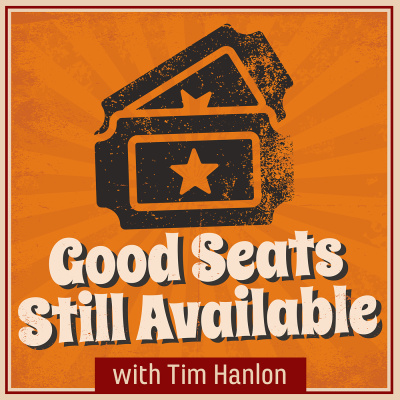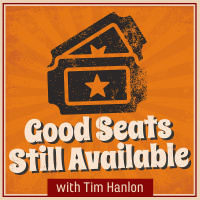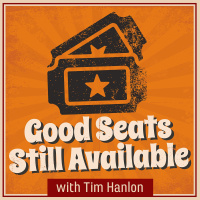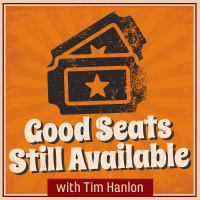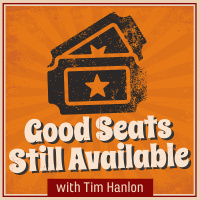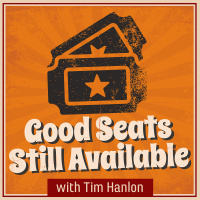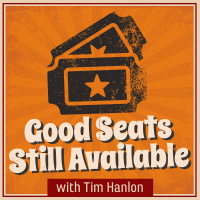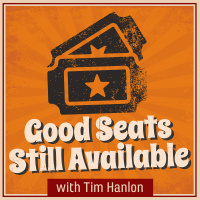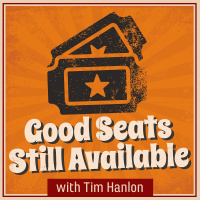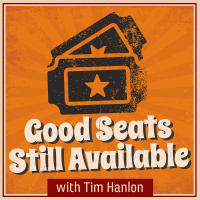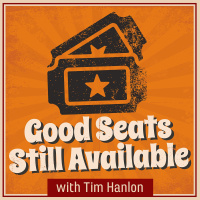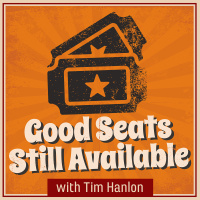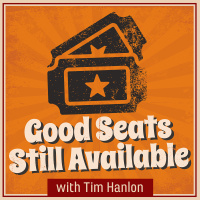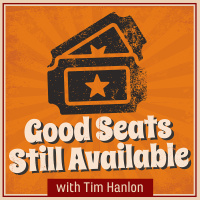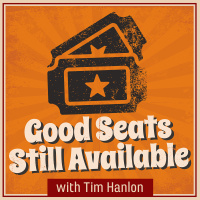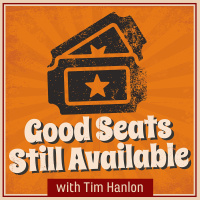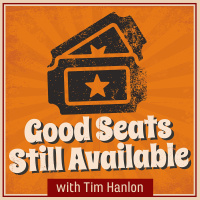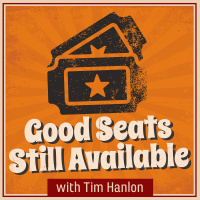Synopsis
Good Seats Still Available is a curious little podcast devoted to the exploration of what used-to-be in professional sports. Each week, host Tim Hanlon interviews former players, owners, broadcasters, beat reporters, and surprisingly famous "super fans" of teams and leagues that have come and gone - in an attempt tounearth some of the most wild and woolly moments in (often forgotten) sports history.
Episodes
-
071: National Soccer Hall of Fame Coach Al Miller - Part Two
23/07/2018 Duration: 01h28minWe conclude our conversation with National Soccer Hall of Fame coach Al Miller, who shares a wide array of additional recollections, anecdotes, musings, and insights from a legendary career across US outdoor and indoor soccer, including: An historic February 11, 1974 indoor game at Philadelphia’s Spectrum between Miller’s NASL champion Atoms and Moscow’s Red Army – generally acknowledged as the true genesis of the Major Indoor Soccer league four years later; The positives and the negatives of the New York Cosmos “superteam” that dominated the NASL in the late 1970s/early 1980s; Trading the Dallas Tornado’s cozy downtown confines of SMU’s Ownby Stadium for the major league bigtime of Irving’s Texas Stadium; The only-in-the-NASL saga of the one-year Calgary Boomers; Reuniting with Lamar Hunt via the 1983 Tampa Bay Rowdies; AND Helping the city of Cleveland end a 30-year pro sports championship drought with the 1993-94 NPSL season-winning Cleveland Crunch. Please check out our great sponsors Podfly, SportsHist
-
070: National Soccer Hall of Fame Coach Al Miller
16/07/2018 Duration: 01h20minIn February 1973, the suddenly ascendant North American Soccer League hurriedly awarded a new franchise to Philadelphia construction magnate Thomas McCloskey, despite the league’s fast-approaching season start date of May 1st. The result of some Super Bowl VII arm-twisting by Kansas City Chiefs (and NASL Dallas Tornado) owner Lamar Hunt after helping McCloskey secure last-minute tickets, the team that would soon become the Philadelphia Atoms had only three months to move from birth to first game. In desperate need of a head coach, McCloskey and GM/soccer novice Bob Ehlinger turned to a bright young Hartwick College coach named Al Miller to hastily assemble a roster and a playing style, which Miller quickly achieved with a handful of English lower-division journeymen married with a bevy of hungry, underappreciated American players from the college ranks – rapidly gelling into an NASL championship team that stunned the pro soccer pundits (including the editors of Sports Illustrated), and became a Philly fan s
-
069: The “Rebel” World Hockey Association with Ed Willes
09/07/2018 Duration: 01h34minFresh off of kicking pro basketball’s establishment in the teeth with the launch of the upstart American Basketball Association in 1967, inveterate sports entrepreneurs Dennis Murphy (see also: World Team Tennis, Roller Hockey International) and Gary Davidson (World Football League) turned their attention to an even riper target of opportunity in 1971 – the monopolistic and monochromatic 12-team National Hockey League. Their broadside against the NHL was the audaciously aspirational World Hockey Association – a seven-season 1970s-era wonder that brought a rollicking brand of ice hockey to no fewer than 27 markets across North America (not including four announced teams that relocated before even playing a game) – leaving in its wake a bevy of bounced checks, fractious lawsuits, and defunct franchises from San Diego to Cherry Hill, New Jersey. Amidst the league’s traveling circus of the weird (the Chicago Cougars’ 1974 playoff run ended by Peter Pan), and wonderful (the Houston Aeros’ Gordie, Mark and Marty
-
068: The Birth of Major League Baseball’s World Series with SABR Historian Steve Steinberg
02/07/2018 Duration: 01h20minAt the beginning of the 20th century, the professional game of baseball had already taken on much of its modern shape – where pitching and managerial strategy dominated, and “manufactured” offense meant taught and tense contests, albeit often with limited scoring. Stretching roughly from 1901-19, the period dubbed the “Deadball Era” by baseball historians saw teams play in expansive ball parks that limited hitting for power, while featuring baseballs that were, by modern-day comparison, more loosely wound, weakly bound and regularly overused. Against this backdrop, the established National and upstart American Leagues hammered out their seminal “National Agreement” in 1903, which not only proclaimed the competing circuits as equals, but also mandated a season-ending (and aspirationally titled) “World’s Championship Series” to determine annual supremacy in the sport – now known more simply as the World Series. Society of American Baseball Research (SABR) historian Steve Steinberg (The World Series in the Dea
-
067: Behind-the-Scenes Tales from the Front Office with Thom Meredith
25/06/2018 Duration: 02h10minOur World Cup fever has yet to break, and we spend this week reveling in some of the heretofore unexplored (at least on this podcast) nooks and crannies of modern-day American pro soccer history with one of its most unsung front office heroes. In a career spanning over four decades, sports PR and event management executive Thom Meredith has proverbially “seen it all” across some of US sports’ most remarkable leagues, franchises and governing bodies – including remarkable (and sometimes dubious) assignments like: handling press for the woeful NFL expansion Tampa Bay Buccaneers of 1976-77; managing communications for Lamar Hunt’s World Championship Tennis circuit of the early 1980s; and directing a litany of events for the fast-growing (and World Cup USA-fueled) US Soccer Federation of the 1990s. But it’s Meredith’s work across some of the most exciting (and exasperating) teams of the late 1970s/early 1980s North American Soccer League – the Tampa Bay Rowdies, Washington Diplomats, Philadelphia Fury, and Dall
-
066: Sports Broadcaster JP Dellacamera
18/06/2018 Duration: 01h30minFox Sports soccer play-by-play broadcaster extraordinaire JP Dellacamera joins the podcast this week to discuss a pioneering career in sports announcing spanning over 30 years – including calling this year’s 2018 FIFA World Cup in Russia – his ninth consecutive men’s quadrennial assignment since Mexico ’86. Widely acknowledged as the original voice of US Soccer, Dellacamera’s calls have become synonymous with some of modern-day American soccer’s most indelible moments – including his accounts of the US Women’s National Team’s dramatic penalty kick shootout victory over China in the 1999 FIFA Women’s World Cup, and Paul Caligiuri’s historic “Shot Heard ‘Round the World” against Trinidad & Tobago in the final game of 1989 CONCACAF qualifying that punched the US Men’s National Team’s ticket for Italy ’90 – ending a 40-year World Cup finals drought, and reorienting the sport’s trajectory in the ‘States for decades to come. The road to broadcasting global soccer’s marquee events has by no means been a straight
-
065: The CFL’s American Expansion Experiment with Sportswriter Ed Willes
11/06/2018 Duration: 01h58minAs Johnny Manziel’s pro football comeback journey wraps up a promising pre-season with the Canadian Football League’s Hamilton Tiger-Cats, we take a moment this week to reminisce on the approaching 25th anniversary of the CFL’s bold, but ultimately ill-fated attempt to bring its exciting brand of pigskin south of the border in 1993. When the NFL put the brakes on its two-year World League of American Football experiment in the summer of 1992 (which included a franchise in Montreal, dubbed the “Machine”), an economically wobbly CFL sensed an opportunity to fill the gap in US markets newly comfortable with the notion of pro football, as well as a potential growth path for the tradition-rich Canadian game to expand outside the Provinces. In fact, two WLAF owners, Fred Anderson (Sacramento Surge) and Larry Benson (San Antonio Riders) "crossed over" to the Canadian League and were awarded newly rechristened franchises for 1993 – Anderson’s Sacramento Gold Miners and Benson's San Antonio Texans. While the Gold Mi
-
064: American Soccer’s “Dark Ages” with Writer Michael J. Agovino
04/06/2018 Duration: 01h27minIt wasn’t easy being a soccer fan in the United States in the 1980s. While the 24-team North American American Soccer League ushered in the decade with an air of stability and momentum (the NASL even sold a pennant labeling the game the “Sport of the 80’s”), it wasn’t long before big-time American pro soccer was dangerously on the ropes (the NASL shrank to just nine franchises by 1984) – and then seemingly gone for good when the league officially sank into oblivion in early 1985. For a nascent generation of US fans newly hooked on the world’s “beautiful game,” it felt like an abandonment – and an air of disillusionment beset the American soccer scene in the immediate years that followed. For Bronx-born writer Michael J. Agovino (The Soccer Diaries: An American's Thirty-Year Pursuit of the International Game), the demise of the NASL and its global flagship New York Cosmos franchise was simply the last nail in the coffin of his soccer “coming of age” during the early 80s – the conclusion of an arc of tragedi
-
063: Baseball's Federal League with Author Dan Levitt
28/05/2018 Duration: 01h35minIn late 1913, the newly formed Federal League of Base Ball Clubs – more simply known as the “Federal League” – declared itself a third major professional baseball league in competition with the established circuits of organized baseball, the National and American Leagues. Led by inveterate baseball promoter John T. Powers, and backed by some of America’s wealthiest merchants and industrialists, the Federal League posed a real challenge to baseball’s prevailing structure at the time – offering players the opportunity to avoid the restrictions of the organized leagues' oppressive and despised reserve clause. The competition of another, better-paying (though detractor-labeled “outlaw”) league caused players' salaries to skyrocket, and quickly demonstrated the bargaining potential of free agency for the first time – seeds first sown two decades earlier by the similarly-intentioned Players’ League in 1890. For the next two seasons, NL and AL owners fought back furiously in the press, in the courts, and on the fi
-
062: The Whaler Guys
21/05/2018 Duration: 01h29minIt’s been 21 years since the National Hockey League’s Hartford Whalers abruptly bolted for the (supposedly) greener pastures of North Carolina and a rechristened life as the Carolina Hurricanes, but don’t tell that to superfans Peter Hindle and Jerry Erwin – the self-professed “Whaler Guys” – who have made it their personal mission since 2011 to keep the memory of the franchise they love alive, and, with any luck, bring top-tier pro NHL hockey back to the Nutmeg State. As the hosts of their eponymous weekly Hartford Public Access TV show, Hindle and Erwin are not only passionate about remembering what the Whalers used to be, but also relentlessly focused on virtually every aspect of local civic development that might help someday return the city of Hartford to the ranks of “major league” status once again. We get into all things Whalers past (the legendary “Brass Bonanza” theme song, the iconic logo); present (XL Center renovation updates, the Guys’ Whaler-themed Connecticut state license plate initiative);
-
061: Sports Promoter Doug Verb
14/05/2018 Duration: 03h06minIf someone ever decides to build an American sports promotion Hall of Fame, the inaugural class will undoubtedly be led by this week’s special guest, Doug Verb. In a career spanning more than 40 years in professional sports management, Verb’s remarkable career has included spearheading marketing, promotion, publicity, and television for some of the most innovative and memorable leagues and franchises of the modern era. One of the founding executives of both the pioneering Major Indoor Soccer League (along with sports entrepreneurs Earl Foreman, Ed Tepper, and previous podcast guest Dr. Joe Machnik), and the frenetic Arena Football League (with the sport’s inventor [and past two-part guest] Jim Foster), Verb additionally served as president of pro soccer’s legendary Chicago Sting from 1982-86 – which, incredibly, drifted between playing in two separate leagues during his tenure (for one year, simultaneously) – the outdoor North American Soccer League and the indoor MISL. In our longest and more anecdote-fi
-
060: Baseball’s League That Never Was: The Continental League with Professor Russ Buhite
07/05/2018 Duration: 01h22minBy the summer of 1959, the absence of two former National League franchises from what was once a vibrant New York City major league baseball scene was obvious – and even the remaining/dominant Yankees couldn’t fully make up for it. Nor could that season’s World Series championship run of the now-Los Angeles Dodgers – a bittersweet victory for jilted fans of the team’s Brooklyn era. Fiercely determined to return a National League team to the city, mayor Robert Wagner enlisted the help of a Brooklyn-based attorney named William Shea to spearhead an effort to first convince a current franchise to relocate – as the American League’s Braves (Boston to Milwaukee, 1953), Browns (St. Louis to Baltimore, 1954), and A’s (Philadelphia to Kansas City, 1955) had recently done. When neither Cincinnati, Pittsburgh, Philadelphia, or even MLB Commissioner Ford Frick, could be convinced by the opportunity, Shea and team moved on to an even bolder plan – an entirely new third major league, with a New York franchise as its c
-
059: Pro Soccer’s Dean of Media Relations, Jim Trecker
30/04/2018 Duration: 01h54minWith a career spanning more than four decades, the National Soccer Hall of Fame’s 2017 Colin Jose Media Award-winner Jim Trecker has been part of the American sports media relations landscape since the late 1960’s. After a chance part-time undergrad job in Columbia University’s modest sports information department, Trecker traded his initial career ambitions in French language education for what ultimately became an unmatched professional journey in public relations at the highest levels of international sports. After cutting his PR teeth with various post-grad pro sports gigs around New York (including work for the Madison Square Garden-owned New York Skyliners [actually Uruguay’s C.A. Cerro] of the 1967 United Soccer Association), Trecker helped manage media relations for the “Broadway” Joe Namath-era AFL-then-NFL New York Jets – a whirling dervish of major league sports information management that transfixed both the Gotham and national press corps, especially in the wake of a surprising Super Bowl III ch
-
058: The Intersection of Sports & Art with Artist/Designer Wayland Moore
23/04/2018 Duration: 01h02minInternationally acclaimed multi-media artist/illustrator/designer Wayland Moore joins the podcast from his studio in suburban Atlanta to discuss his nearly six-decade career as one of America’s most recognizable commercial artists – including some of his most notable works in the realm of professional sports. Designer of such iconic team logos such as pro soccer’s Atlanta Chiefs (National Professional Soccer League, 1967; North American Soccer League, 1968-73 & 1979-81); and, most legendarily, New York Cosmos (NASL, 1971-85) – Moore is also known for his extensive promotional artwork for baseball’s Atlanta Braves, including the design and color scheme for the team’s 1974 season uniform, in anticipation of the worldwide attention surrounding Henry Aaron’s eventual record-breaking 715th career home run on April 8, 1974 – forever memorialized in “Hammerin’ Hank”’s Baseball Hall of Fame exhibit. In this very intriguing conversation, Moore reflects on: his most memorable commissioned pieces from major sporti
-
057: The Pro Football Life of Upton Bell
16/04/2018 Duration: 02h05minUpton Bell grew up at the knee of the National Football League’s second-ever commissioner – his father, the legendary Bert Bell – who not only saved professional football from financial ruin in the aftermath of World War II, but also became one of its greatest innovators. Originator of the iconic phrase “on any given Sunday,” the senior Bell created lasting contributions to the NFL, such as the first pro football draft, scheduling parity, television revenue-sharing, and sudden-death overtime. For the junior Upton, it was a priceless childhood amidst pro football’s formative years – begun while watching his father draw up the league schedule each year using dominoes at the kitchen table – steeped in the personalities, lore, and economic pragmatism of a game that would ultimately dominate the American professional sports landscape like no other. In a seemingly preordained career, Upton Bell (Present at the Creation: My Life in the NFL and the Rise of America’s Game) has been an owner (the wacky World Football
-
056: The Players’ League of 1890 with Professor Bob Ross
09/04/2018 Duration: 01h33minWith Major League Baseball finally back in full swing, we dial the Wayback Machine all the way back to the year 1890, when the professional version of America’s Pastime was still nascent, its business model was largely unproven, and the players of the day seethed at their team owners’ increasingly restrictive operating practices – to the point of dramatic and open revolt that ultimately set the contentious tone of owner-player relations for baseball and all of US pro sports for generations to follow. Global cultural studies professor Bob Ross (The Great Baseball Revolt: The Rise and Fall of the 1890 Players League) joins host Tim Hanlon to discuss the short-lived professional baseball league controlled and owned in part by players themselves – a response to the dominant National League’s salary cap and “reserve rule,” which bound players to one team for life. Led by curveball-pioneering and first-ever sports labor union-founding (and eventual baseball Hall of Famer) John Montgomery Ward, the Players’ League
-
055: Russ Cline and the Birth of Modern-Day Indoor Box Lacrosse
02/04/2018 Duration: 01h23minOur first-ever (and long-overdue) exploration of the sport of professional lacrosse begins with a conversation with one of the godfathers of the modern indoor game, Russ Cline – founder (along with partner and fellow Kansas City sports promoter Chris Fritz) of 1987’s seminal four-team Eagle Pro Box Lacrosse League (soon renamed the Major Indoor Lacrosse League) – and the progenitor of today’s vibrant National Lacrosse League that spans 11 cities across the US and Canada. Cline walks obsessive inquisitor Tim Hanlon through: the duo’s rationale behind choosing lacrosse as the focus of their entrepreneurial efforts; the slow-growth approaches to expansion beyond the lacrosse-rich Northeast and national television coverage; the business model battle between single-entity and individually-owned franchises; and the delicate balance between maintaining the integrity of the sport’s rich history and marketing a hard-hitting, high-scoring, action-packed entertainment product. Plus: playing surfaces borne of carpet rem
-
054: Effa Manley & the Negro National League’s Newark Eagles with Biographer Bob Luke
26/03/2018 Duration: 01h10minBaseball historian Bob Luke (The Most Famous Woman in Baseball: Effa Manley and the Negro Leagues) joins host Tim Hanlon to delve into the intriguing story of the first (and still only) woman to be inducted into the National Baseball Hall of Fame – and the second Negro National League’s Newark Eagles franchise she successfully co-owned (with husband Abe) and general managed from 1936-48. A student of the sport since early childhood with a keen sense of promotion, marketing and player welfare, Manley blended a strong baseball operations IQ with a savvy aptitude for local politics and African-American community issues to become a dominant front office force in the Negro Leagues, and a persistent champion of player integration that ultimately transformed the white-male-dominated National and American “major” leagues in the late 1940s. Manley’s Eagles teams consistently performed well on the field and at the gate, and her deft management style culminated in a Negro World Series championship for the Eagles in 1
-
053: NHL Hockey’s Minnesota North Stars with Author Adam Raider
19/03/2018 Duration: 01h37minIn this week’s episode, we skate back to the National Hockey League’s 1967 “Great Expansion,” when the league ambitiously doubled in size from its “Original Six” to incorporate a half-dozen new franchises – including the seemingly most obvious and overdue market of all: the hockey-mad state of Minnesota and its cultural epicenter, Minneapolis-St.Paul. With a skilled management team led by amateur hockey pioneer Walter Bush, the Minnesota North Stars fielded a team-minded and quickly respectable squad of NHL journeymen, castoffs and amateurs that immediately won the hearts of the hometown Met Center faithful. By the mid-1970s, however, the North Stars had fallen on hard times, with perennially poor records and few playoff berths – until 1978, when, in an unprecedented arrangement, Cleveland Barons (née California Golden Seals) franchise owner-brothers Gordon and George Gund acquired the team and merged them. Bolstered by an immediate influx of quality Barons like goaltender Gilles Meloche and forwards Al Ma
-
052: The Wild & Wacky World Football League with Author Mark Speck - Part Two
12/03/2018 Duration: 01h01minWe conclude our conversation with WFL researcher Mark Speck (WIFFLE: The Wild, Zany and Sometimes Hilariously True Story of the World Football League; World Football League Encyclopedia; . . .And a Dollar Short: The Empty Promises, Broken Dreams, and Somewhat-Less-Than-Comic Misadventures of the 1974 Florida Blazers), as we find the league limping its way through an inaugural 1974 campaign that featured two mid-season franchise relocations (Houston to Shreveport, and New York to Charlotte), two outright team collapses (Detroit and Jacksonville), dwindling attendance and TV ratings, the ousting of league founder/commissioner Gary Davidson – and a championship “World Bowl” between two cash-strapped finalists (Birmingham and Florida) that was only allowed to take place after the IRS agreed to accept the game’s gate receipts as payment for an overdue tax bill. A return for an improbable second season in 1975 was made possible only by dissolving the league entirely and legally reconstituting into a second incarnat
